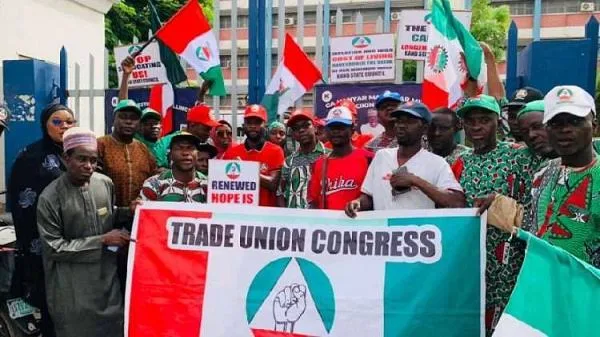The Trade Union Congress of Nigeria (TUC) on Monday called on the Federal Government to immediately cancel its planned five per cent tax on petroleum products, warning that it would unleash fresh hardship on citizens already grappling with economic difficulties.
In a statement issued in Lagos, the Labour Centre said it “outrightly rejects” the levy, describing it as “economic wickedness against already overburdened Nigerians.”
The surcharge, introduced under the newly signed Nigeria Tax Administration Act—one of four tax reform bills signed into law by President Bola Tinubu on June 26, 2025—requires a 5% charge on every sale of refined fossil fuel products in Nigeria, whether imported or locally produced. Exemptions apply only to cleaner fuels such as renewables, household kerosene, cooking gas, and compressed natural gas.
Industry players have already raised concerns. The Petroleum Products Retail Outlets Owners Association of Nigeria warned that the law could force many operators out of business, while Extractive360, a civil society watchdog, argued that the levy would push petrol prices even higher.
Analysts note that petrol, now selling at an average of ₦950 per litre—a 382% increase from ₦197 per litre when President Tinubu took office in May 2023—remains the lifeline for transport and small-scale energy needs in the country.
TUC President, Festus Osifo, and Secretary-General, Nuhu Toro, condemned the policy, stressing that Nigerian workers are already struggling with the fallout of subsidy removal, food inflation, and the naira’s sharp decline.
“To now introduce another levy on petroleum products is to deliberately compound suffering, cripple businesses, and push millions of citizens deeper into poverty,” the statement read.
“Government cannot continue to use Nigerians as sacrificial lambs for its economic experiments… This is unacceptable!”
The TUC issued a strong warning that it would mobilise its members and Nigerians at large for nationwide resistance, including strike action, if the government fails to drop the plan.
The union also called on civil society groups, professional bodies, student unions, market associations, religious leaders, and other stakeholders to stand in solidarity against what it described as an anti-people policy.
“Enough is enough. Nigerians deserve economic justice, not endless punishment,” the statement concluded.


